Breadcrumb
Our Impact
At Stellenbosch University, we are committed to shaping a sustainable and socially just future. By integrating social impact, sustainability and environmental stewardship into our research, teaching and campus life, we address pressing challenges and contribute to the United Nations Sustainable Development Goals and Africa’s Agenda 2063.
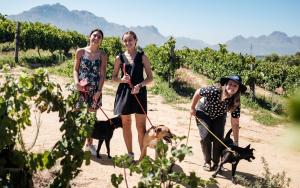
Our social impact initiatives
At Stellenbosch University, we are committed to social responsibility, equity and impact-driven engagement, ensuring that the knowledge we create is applied to benefit society. This commitment is realised by advancing engaged citizenship, societal transformation and equitable outcomes through work that bridges the gap between research, learning and real-world change.
Our students, academics, and support staff play a vital role in addressing social challenges through co-curricular programmes, community outreach, volunteering and initiatives aligned with the Sustainable Development Goals.
Our social impact initiatives
The Centre for the Advancement of Social Impact and Transformation support these efforts by offering training and development programmes, experiential learning opportunities, reflective offerings (like critical diversity literacy) and scholarly knowledge exchange. Partnerships with grassroots organisations, community stakeholders and institutional units help co-create solutions rooted in local needs.

Annual Social Impact community morning
During Welcoming Week, ver 6 000 newcomer students take part in hands-on projects such as clean-ups, meal packing and educational programmes, linking academic knowledge to real-world impact.

Sustainable Development Goals initiatives
Projects across SU are aligned with SDGs, including gender equity, climate action and poverty alleviation.

Community development partnerships
SU collaborates with local organisations to co-create solutions in health, education and environmental sustainability.

Reflective learning and critical diversity literacy
Training and workshops foster empathy, responsibility and innovation in tackling societal challenges.

Volunteering and outreach programmes
Students and staff engage in mentoring, tutoring and service initiatives that support vulnerable communities.
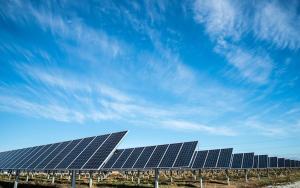
Our sustainable development
At Stellenbosch University, sustainable development is a core commitment: We strive to meet today’s needs while safeguarding the ability of future generations to thrive. Our approach is holistic, integrating environmental, social and economic sustainability principles across teaching, research, stewardship and engagement with society.
We are proud of our contributions to the United Nations’ 2030 Agenda and its Sustainable Development Goals (SDGs), as well as the African Union’s Agenda 2063, which envisions a peaceful, prosperous and integrated Africa. Both agendas are firmly anchored in SU’s Vision 2040 and Strategic Framework 2019–2024.
Our approach
To drive our sustainability agenda, the SDG/2063 Impact Hub was established in late 2021. Housed within SU International, the Hub ensures that SU’s contributions to sustainable development are strategic, visible and impactful. Key initiatives include:

Aligning Africa’s priorities with global goals
Positioning the African Union’s Agenda 2063 alongside the SDGs to ensure Africa’s unique priorities are represented in SU’s sustainability efforts.

Promoting sustainability across the University
Advocating for the visible uptake of sustainable development practices throughout SU’s community and operations.

Building sustainability literacy
Introducing opportunities like the Future17 SDG Challenge for our students, equipping the next generation of leaders with the knowledge and skills to contribute to The Africa We Want.
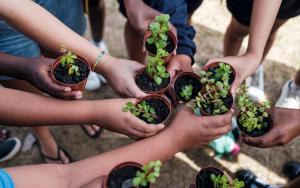
Our environmental sustainability
At Stellenbosch University (SU), we are deeply committed to environmental sustainability, embedding it at the heart of its operations, research and teaching. Recognising the urgent need to address climate change, biodiversity loss and resource scarcity, we strive to create campuses and communities that model sustainable practices.
Our approach is holistic, integrating environmental stewardship across energy use, water management, waste reduction and procurement, while fostering awareness and engagement among staff, students and the broader community.
These efforts are aligned with the United Nations Sustainable Development Goals (SDGs), ensuring that our initiatives contribute meaningfully to global sustainability targets. By combining cutting-edge research, innovation and practical interventions on campus, the university aims not only to reduce its ecological footprint but also to inspire lasting change in society.
Environmental sustainability initiatives at SU:
These initiatives highlight our dedication to responsible resource management, innovative research and a sustainable future.

Carbon neutrality by 2050
SU has launched its Environmental Sustainability Plan, targeting net-zero emissions by 2050.

Waste management
Working towards zero-waste-to-landfill by 2028, with a current diversion rate of 74%.

Energy efficiency
Implementation of energy-saving measures, including solar panels, to reduce consumption and costs.

Sustainable procurement
Ensuring goods and services are sourced sustainably and ethically.

Water conservation
SU actively manages water use on campus through efficient practices, monitoring and innovative conservation strategies.

Community engagement
Actively fostering a regenerative culture through education and outreach initiatives.
Our Impact stories
Stories of discovery, collaboration and real-world change driven by our university community.

Awards and milestones
SU researcher receives R12m grant for disability studies
Dr Zara Trafford, a scholar in disability studies at the Institute for Life Course Health Research in the Faculty of Medicine and Health Sciences at...
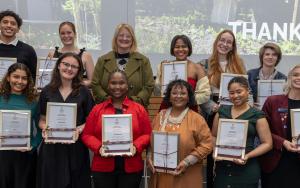
Impact
Stellenbosch University Celebrates Student Changemakers at their 2025 Green Living Awards
Stellenbosch University’s (SU) Green Living Awards (GLA) once again shone the spotlight on the inspiring sustainability efforts of the University’s student...
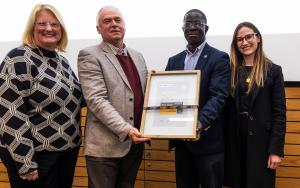
Impact
SU is the first South African University with a Net Zero Carbon Building
Stellenbosch University (SU) has achieved a groundbreaking sustainability milestone with the certification of the STIAS Extension Building as the first Net Zero...
